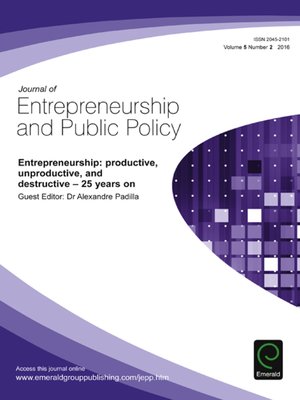Journal of Entrepreneurship and Public Policy, Volume 5, Number 2
ebook ∣ Entrepreneurship: Productive, Unproductive, and Destructive - 25 Years On · Journal of Entrepreneurship and Public Policy
By Joshua Hall

Sign up to save your library
With an OverDrive account, you can save your favorite libraries for at-a-glance information about availability. Find out more about OverDrive accounts.
Find this title in Libby, the library reading app by OverDrive.



Search for a digital library with this title
Title found at these libraries:
| Library Name | Distance |
|---|---|
| Loading... |
In 1990, William Baumol published an article titled "Entrepreneurship: Productive, Unproductive, and Destructive." In doing so he brought both the entrepreneur and the policy environment back into the discussion of why some countries are rich and others are poor. While the classical economists from Adam Smith onward had emphasized entrepreneurship and institutional quality, by 1990 the role of the 'rules of the game' in shaping the activities of entrepreneurs had receded into the background. As a result of Baumol's scholarship, institutional quality and entrepreneurship play a much larger role in our understanding of the process of economic growth and development. By one count, "Entrepreneurship: Productive, Unproductive, and Destructive" has garnered over 4,000 citations since 1990.
This special issue honors and builds upon the work of William Baumol as exemplified in "Entrepreneurship: Productive, Unproductive, and Destructive." The papers in this special issue were originally presented at a symposium that took place during the annual meeting of the Southern Economic Association in 2015. This symposium and special issue were organized by Dr. Alexandre Padilla of Metropolitan State College of Denver. The prominent scholars invited to present new research further exploring the themes of Baumol's seminal article did not disappoint.
The papers included in this special issue:
As these papers show, William Baumol's insight on how different institutional arrangements provide different incentives for entrepreneurs to allocate their talents had a profound impact on researchers in economics and entrepreneurship. The common message communicated is that the insights of Baumol's seminar article are far more powerful than might have been apparent in the early 1990s. There is a lot of more research to be done on the relationship between institutions – the rules of the game – and the role of entrepreneurs in the development process.







